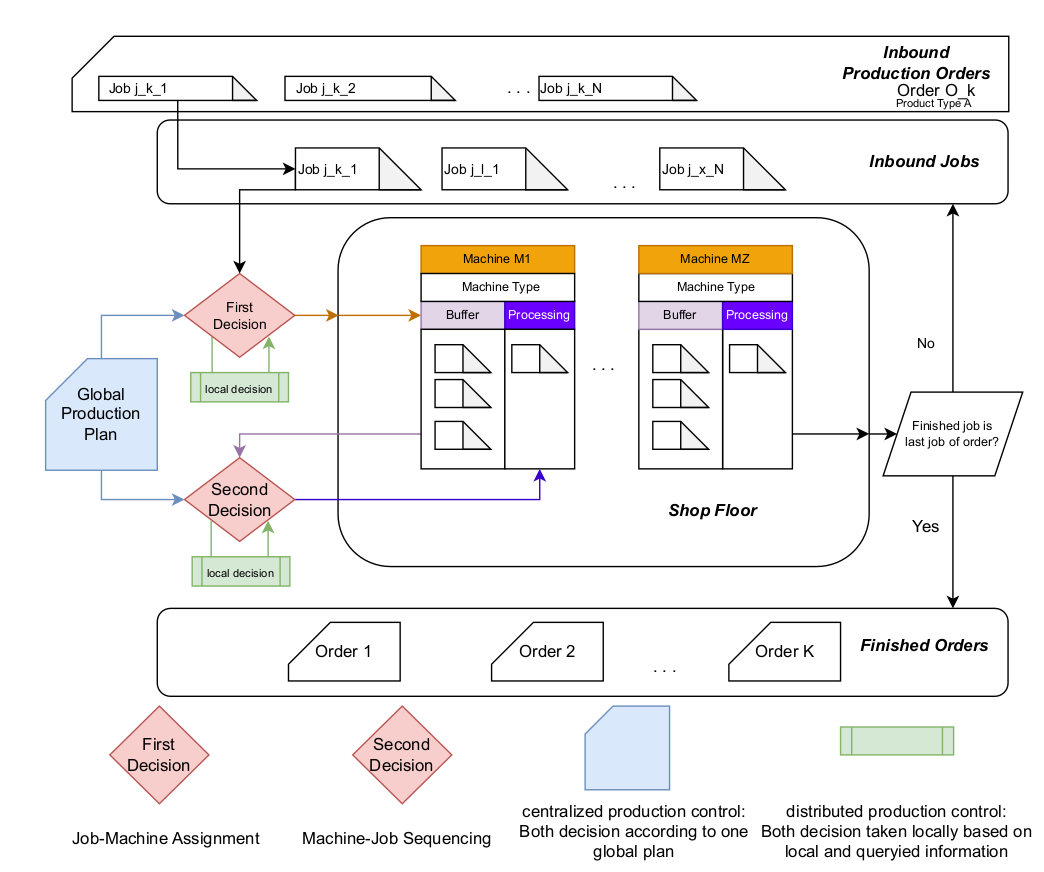2024
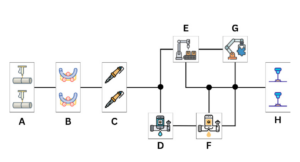
Andrea Somma; Oliver Antons; Alberto Petrillo; Stefania Santini; Teresa Murino
On the Verification of Distributed Control for Multi Job Shop Assignment Problem in Smart Manufacturing System Journal Article
In: IFAC-PapersOnLine, vol. 58, no. 19, pp. 217-222, 2024, ISSN: 2405-8963, (18th IFAC Symposium on Information Control Problems in Manufacturing INCOM 2024).
Abstract | Links | BibTeX | Tags: Control, Digital-Model-Based Simulation, Distributed control, Multi-Job Shop Scheduling, Smart Manufacturing Planning
@article{SOMMA2024217,
title = {On the Verification of Distributed Control for Multi Job Shop Assignment Problem in Smart Manufacturing System},
author = {Andrea Somma and Oliver Antons and Alberto Petrillo and Stefania Santini and Teresa Murino},
url = {https://www.sciencedirect.com/science/article/pii/S2405896324015866},
doi = {https://doi.org/10.1016/j.ifacol.2024.09.171},
issn = {2405-8963},
year = {2024},
date = {2024-01-01},
urldate = {2024-01-01},
journal = {IFAC-PapersOnLine},
volume = {58},
number = {19},
pages = {217-222},
abstract = {The increasing need of product individualization and rapid demand fluctuation leads industrial manufacturers to leveraging new control solutions for production planning and control. Among these, distributed control approaches for the multi job shop scheduling problem could be a promising solution to make smart manufacturing systems more responsive to the market. In this context, this paper aims at investigating the effectiveness and the benefits of distributed control approaches for solving the multi job shop assignment problem on a real-world smart manufacturing process involving the production of high-vacuum solar panels. The validation is carried out by leveraging Cyber-Physical Systems modelling and a digital model-based procedure which, interacting with the physical plant, provides the proper job assignment in order to optimize the overall makespan and work-in-progress in a fully-distributed fashion.},
note = {18th IFAC Symposium on Information Control Problems in Manufacturing INCOM 2024},
keywords = {Control, Digital-Model-Based Simulation, Distributed control, Multi-Job Shop Scheduling, Smart Manufacturing Planning},
pubstate = {published},
tppubtype = {article}
}
2023
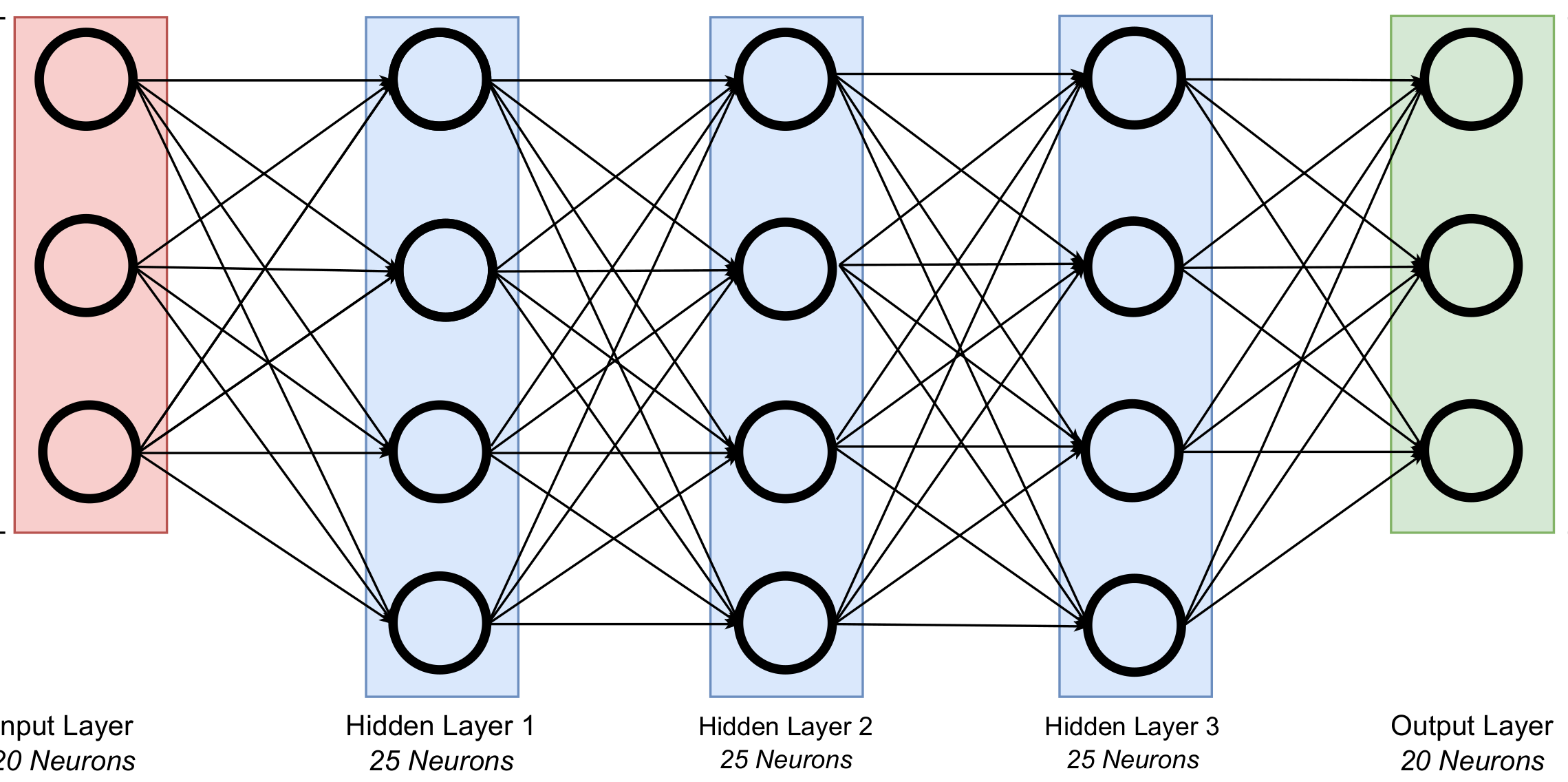
Oliver Antons; Julia C. Arlinghaus
Maximum Likelihood and Neural Network Estimators for Distributed Production Control Proceedings Article
In: IFAC-PapersOnLine , pp. 10327-10332, 2023, ISSN: 2405-8963, (22nd IFAC World Congress).
Abstract | Links | BibTeX | Tags: Autonomy & Decision-making Authority, Cyber-physical system, Distributed control, Machine learning, Production planning and control, Smart manufacutring systems
@inproceedings{nokey,
title = {Maximum Likelihood and Neural Network Estimators for Distributed Production Control},
author = {Oliver Antons and Julia C. Arlinghaus},
url = {https://www.sciencedirect.com/science/article/pii/S2405896323014210},
doi = {10.1016/j.ifacol.2023.10.1038},
issn = {2405-8963},
year = {2023},
date = {2023-07-14},
urldate = {2023-07-14},
booktitle = {IFAC-PapersOnLine },
volume = {56},
number = {2},
pages = {10327-10332},
abstract = {Cyber-physical systems have become increasingly common in recent years, providing a multitude of information regarding production processes. At the same time, increasing volatilities, uncertainties, complexity and ambiguity (VUCA) are challenging existing production control approaches for manufacturing networks. Data-driven control approaches are an avenue to address VUCA, but require further study in research and practice. We utilize a multi-agent based discrete-event simulation to compare the aptitudes of a maximum likelihood and neural network based estimator for distributed production control, and provide insights into application of machine learning to address ever increasing information and VUCA.},
note = {22nd IFAC World Congress},
keywords = {Autonomy \& Decision-making Authority, Cyber-physical system, Distributed control, Machine learning, Production planning and control, Smart manufacutring systems},
pubstate = {published},
tppubtype = {inproceedings}
}
Oliver Antons; Julia C. Arlinghaus
Designing distributed decision-making authorities for smart factories – understanding the role of manufacturing network architecture Journal Article
In: International Journal of Production Research, vol. 0, no. 0, pp. 1-19, 2023.
Abstract | Links | BibTeX | Tags: Autonomous production control, Autonomy & Decision-making Authority, Centralized control, Decision-making authority, Distributed control, Manufacturing network topology, Production planning and control
@article{doi:10.1080/00207543.2023.2217285,
title = {Designing distributed decision-making authorities for smart factories \textendash understanding the role of manufacturing network architecture},
author = {Oliver Antons and Julia C. Arlinghaus},
url = {https://doi.org/10.1080/00207543.2023.2217285},
doi = {10.1080/00207543.2023.2217285},
year = {2023},
date = {2023-01-01},
urldate = {2023-01-01},
journal = {International Journal of Production Research},
volume = {0},
number = {0},
pages = {1-19},
publisher = {Taylor \& Francis},
abstract = {The availability of cyber-physical systems (CPS) in modern manufacturing networks provides a multitude of interesting opportunities from a manufacturing control perspective. Providing sensors, data gathering, local computation and communication capabilities modern CPS fulfil the technical requirements to act completely autonomously in a manufacturing network. While the distribution of decision-making authority to autonomous entities is feasible given such requirements, practice often sees the monopolisation of decision-making authority for centralised control. However, distributed production control approaches might be better suited given current manufacturing challenges, ranging from unreliable supply chains over highly volatile markets, to the demand for increasingly efficient and highly customisable production. In this article, we extend an existing scheduling complexity framework which enables practitioners and researchers alike to assess the aptitude of given manufacturing networks for both centralised and distributed control. In particular, we study the influence of a manufacturing network's topology ranging from assembly line to job shops on the aforementioned aptitude, with total production costs as objective.
We utilise a multi-agent-based discrete-event simulation comparing an MILP-based centralised control approach and an autonomy based distributed control approach with weighted costs as decision function to evaluate this framework. Our results provide novel insights regarding the influence of manufacturing network topologies on the scheduling complexity of manufacturing networks.},
keywords = {Autonomous production control, Autonomy \& Decision-making Authority, Centralized control, Decision-making authority, Distributed control, Manufacturing network topology, Production planning and control},
pubstate = {published},
tppubtype = {article}
}
We utilise a multi-agent-based discrete-event simulation comparing an MILP-based centralised control approach and an autonomy based distributed control approach with weighted costs as decision function to evaluate this framework. Our results provide novel insights regarding the influence of manufacturing network topologies on the scheduling complexity of manufacturing networks.
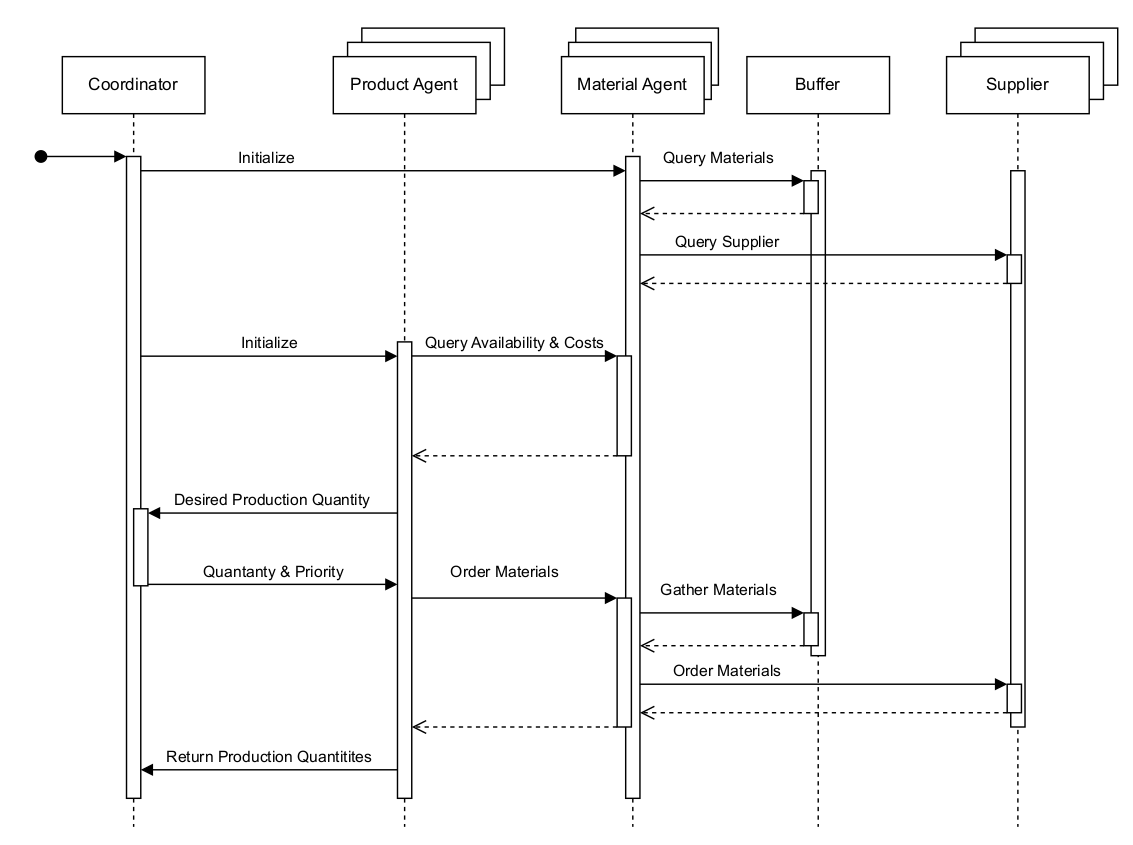
Oliver Antons; Tobias Benecke; Sanaz Mostaghim; Julia C. Arlinghaus
Sustainability in Chemical Production–Multi-Objective Distributed Control Book Section
In: New Trends in Intelligent Software Methodologies, Tools and Techniques, pp. 211–219, IOS Press, 2023.
Abstract | Links | BibTeX | Tags: Chemical industry, Circular Economy, Distributed control, Optimization, Sustainability
@incollection{antons2023sustainability,
title = {Sustainability in Chemical Production\textendashMulti-Objective Distributed Control},
author = {Oliver Antons and Tobias Benecke and Sanaz Mostaghim and Julia C. Arlinghaus},
doi = {10.3233/FAIA230236},
year = {2023},
date = {2023-01-01},
urldate = {2023-01-01},
booktitle = {New Trends in Intelligent Software Methodologies, Tools and Techniques},
pages = {211\textendash219},
publisher = {IOS Press},
abstract = {Chemical industry provides a multitude of intermediaries and final products essential to society, ranging from fertilizers and plastics to sophisticated pharmaceuticals. The underlying production processes are typically linear, utilizing finite resources in an unsustainable manner and creating unnecessary waste over a products lifetime. While a shift towards sustainability and circular economy is desired, the current market and political framework lead to conflicting objectives ranging from sustainability to profit maximization. In this article, we build upon a first minimal multi-objective MILP model and extend thereupon, reducing the overall level of required abstraction compared to the first model. Thereafter, we present a multi-agent based distributed optimization approach for a sequence of the extended MILP formulation.},
keywords = {Chemical industry, Circular Economy, Distributed control, Optimization, Sustainability},
pubstate = {published},
tppubtype = {incollection}
}
2022

Oliver Antons; Julia C. Arlinghaus
Machine Learning and Autonomous Control—A Synergy for Manufacturing Proceedings Article
In: Borangiu, Theodor; Trentesaux, Damien; Leitão, Paulo; Cardin, Olivier; Joblot, Laurent (Ed.): Service Oriented, Holonic and Multi-agent Manufacturing Systems for Industry of the Future, pp. 417–428, Springer International Publishing, Cham, 2022, ISBN: 978-3-030-99108-1.
Abstract | Links | BibTeX | Tags: Autonomy & Decision-making Authority, Distributed control, Machine learning, Manufacturing, Neural network
@inproceedings{10.1007/978-3-030-99108-1_30,
title = {Machine Learning and Autonomous Control\textemdashA Synergy for Manufacturing},
author = {Oliver Antons and Julia C. Arlinghaus},
editor = {Theodor Borangiu and Damien Trentesaux and Paulo Leit\~{a}o and Olivier Cardin and Laurent Joblot},
url = {https://link.springer.com/chapter/10.1007/978-3-030-99108-1_30},
doi = {10.1007/978-3-030-99108-1_30 },
isbn = {978-3-030-99108-1},
year = {2022},
date = {2022-01-01},
urldate = {2022-01-01},
booktitle = {Service Oriented, Holonic and Multi-agent Manufacturing Systems for Industry of the Future},
pages = {417\textendash428},
publisher = {Springer International Publishing},
address = {Cham},
abstract = {This papers studies the synergistic potentials of machine learning and distributed control approaches in a job-shop setting. We utilize a multi-agent based discrete-event simulation to model distributed control in conjunction with a neural network to predict the optimal workshop configuration given fluctuating production demands. Within this simulation model, we study the potential cost and time savings, showing various potentials in the synergistic utilization of distributed control and machine learning for production planning and control in a job-shop manufacturing network.},
keywords = {Autonomy \& Decision-making Authority, Distributed control, Machine learning, Manufacturing, Neural network},
pubstate = {published},
tppubtype = {inproceedings}
}
2021

Oliver Antons; Julia C. Arlinghaus
Adaptive self-learning distributed and centralized control approaches for smart factories Proceedings Article
In: pp. 1577-1582, 2021, ISSN: 2212-8271, (54th CIRP CMS 2021 - Towards Digitalized Manufacturing 4.0).
Abstract | Links | BibTeX | Tags: Autonomy, Autonomy & Decision-making Authority, Cyber-physical system, Data analytics, Decision-making, Discrete-event simulation, Distributed control, Industry 4.0, Multi-agent system, Self-learning, Smart factory
@inproceedings{ANTONS20211577,
title = {Adaptive self-learning distributed and centralized control approaches for smart factories},
author = {Oliver Antons and Julia C. Arlinghaus},
url = {https://www.sciencedirect.com/science/article/pii/S2212827121011641},
doi = {https://doi.org/10.1016/j.procir.2021.11.266},
issn = {2212-8271},
year = {2021},
date = {2021-01-01},
urldate = {2021-01-01},
journal = {Procedia CIRP},
volume = {104},
pages = {1577-1582},
abstract = {The increasing application of cyber-physical systems creates a manufacturing environment in which the technical requirements for distributed control approaches, self-learning systems and analytics of previously untapped data are given. While distributed control approaches are capable to evaluate this information locally and react immediately, centralized approaches react inertly to analyzed machine performance data. In this paper, we study the performance and ability to address the ever increasing challenges in industry of both types of control approaches within an established multi-agent based discrete event simulation.},
note = {54th CIRP CMS 2021 - Towards Digitalized Manufacturing 4.0},
keywords = {Autonomy, Autonomy \& Decision-making Authority, Cyber-physical system, Data analytics, Decision-making, Discrete-event simulation, Distributed control, Industry 4.0, Multi-agent system, Self-learning, Smart factory},
pubstate = {published},
tppubtype = {inproceedings}
}
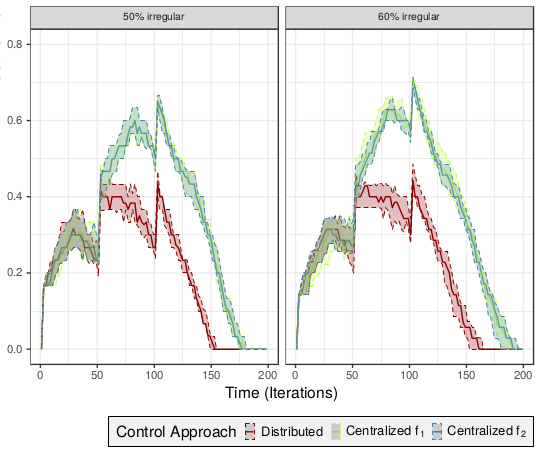
Oliver Antons; Julia C. Arlinghaus
Distributed control for Industry 4.0 -A comparative simulation study Proceedings Article
In: pp. 516-521, 2021, ISSN: 2405-8963, (17th IFAC Symposium on Information Control Problems in Manufacturing INCOM 2021).
Abstract | Links | BibTeX | Tags: Autonomy & Decision-making Authority, Control, Discrete-event simulation, Distributed control, Make-to-order, Manufacturing planning, Multi-agent system
@inproceedings{ANTONS2021516,
title = {Distributed control for Industry 4.0 -A comparative simulation study},
author = {Oliver Antons and Julia C. Arlinghaus},
url = {https://www.sciencedirect.com/science/article/pii/S2405896321007801},
doi = {https://doi.org/10.1016/j.ifacol.2021.08.059},
issn = {2405-8963},
year = {2021},
date = {2021-01-01},
urldate = {2021-01-01},
journal = {IFAC-PapersOnLine},
volume = {54},
number = {1},
pages = {516-521},
abstract = {The recent decades have seen various market changes that industrial manufactures need to address. Increasing individualization of products and rapid demand fluctuations require new control approaches. In this article, we study the performance of centralized and distributed control approaches with regard to work in progress in a make-to-order environment. We utilize a multi-agent system in a discrete-event simulation to model several control approaches and provide various insights into potential benefits of distributed control concepts given rapidly fluctuating manufacturing demand.},
note = {17th IFAC Symposium on Information Control Problems in Manufacturing INCOM 2021},
keywords = {Autonomy \& Decision-making Authority, Control, Discrete-event simulation, Distributed control, Make-to-order, Manufacturing planning, Multi-agent system},
pubstate = {published},
tppubtype = {inproceedings}
}
2020
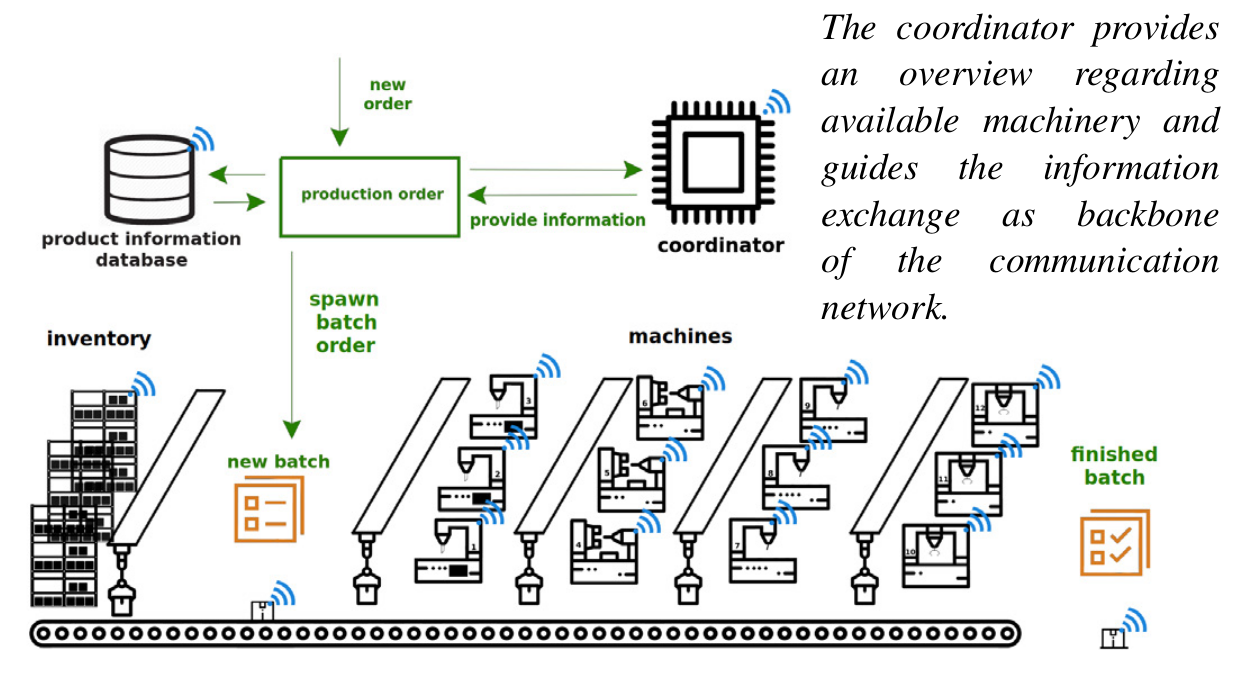
Oliver Antons; Julia C. Arlinghaus
Designing decision-making authorities for smart factories Proceedings Article
In: pp. 316–322, Elsevier, 2020.
Abstract | Links | BibTeX | Tags: Autonomy, Autonomy & Decision-making Authority, Cyber-physical system, Decision-making, Discrete-event simulation, Distributed control, Industry 4.0, Intelligent Product, Multi-agent system, Smart factory
@inproceedings{antons2020designing,
title = {Designing decision-making authorities for smart factories},
author = {Oliver Antons and Julia C. Arlinghaus},
url = {https://www.sciencedirect.com/science/article/pii/S2212827120306120},
doi = {10.1016/j.procir.2020.04.047},
year = {2020},
date = {2020-01-01},
urldate = {2020-01-01},
journal = {Procedia CIRP},
volume = {93},
pages = {316--322},
publisher = {Elsevier},
abstract = {Smart factories are an appealing vision, addressing ever increasing challenges in industry. Driven by advances in microcontroller, sensor and networking technologies, all entities, such as machines, products, load carriers, within a smart factory could become intelligent and able to assess their own situation and to attain their own goals successfully. However, local decision may exacerbate achieving global logistics performance due to the entities intrinsic selfishness. In this paper, we explore the trade-off between local decision-making and global performance management and derive first guidelines for the situation-specific design of a distributed control authority for smart factories.},
keywords = {Autonomy, Autonomy \& Decision-making Authority, Cyber-physical system, Decision-making, Discrete-event simulation, Distributed control, Industry 4.0, Intelligent Product, Multi-agent system, Smart factory},
pubstate = {published},
tppubtype = {inproceedings}
}
2019
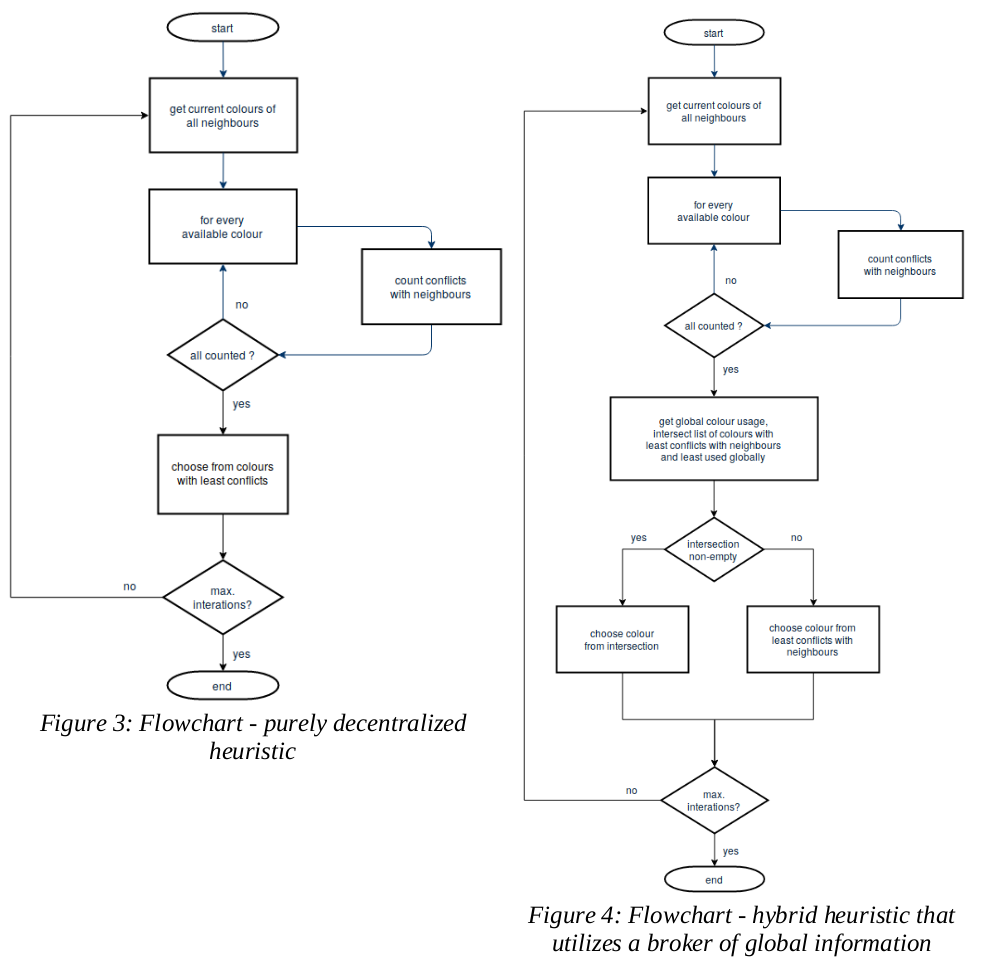
Oliver Antons; Julia C. Bendul
The impact of information and communication flow structures on logistics performance in Industry 4.0 production systems with distributed control Proceedings Article
In: EurOMA19, 2019.
Abstract | BibTeX | Tags: Autonomy & Decision-making Authority, Distributed control, Graph colouring dynamics, Scheduling
@inproceedings{Antons-2019-ID692,
title = {The impact of information and communication flow structures on logistics performance in Industry 4.0 production systems with distributed control},
author = {Oliver Antons and Julia C. Bendul},
year = {2019},
date = {2019-01-01},
urldate = {2019-01-01},
booktitle = {EurOMA19},
abstract = {This paper studies the influence of accessible information and communication in distributed control systems for Industry 4.0 applications. To this end, we compare a purely decentralized and a hybrid heuristic in a multi-agent system in order to solve graph colouring dynamics. By means of simulations, both heuristics are compared, and while no heuristic clearly dominates the other, insights on design challenges in distributed control are derived.},
keywords = {Autonomy \& Decision-making Authority, Distributed control, Graph colouring dynamics, Scheduling},
pubstate = {published},
tppubtype = {inproceedings}
}

Oliver Antons; Julia C. Bendul
Decision making in industry 4.0--a comparison of distributed control approaches Proceedings Article
In: International Workshop on Service Orientation in Holonic and Multi-Agent Manufacturing, pp. 329–339, Springer 2019.
Abstract | Links | BibTeX | Tags: Autonomy & Decision-making Authority, Distributed control, Graph colouring dynamics, Industry 4.0, Multi-agent system
@inproceedings{antons2019decision,
title = {Decision making in industry 4.0--a comparison of distributed control approaches},
author = {Oliver Antons and Julia C. Bendul},
url = {https://link.springer.com/chapter/10.1007/978-3-030-27477-1_25},
doi = {10.1007/978-3-030-27477-1_25},
year = {2019},
date = {2019-01-01},
urldate = {2019-01-01},
booktitle = {International Workshop on Service Orientation in Holonic and Multi-Agent Manufacturing},
pages = {329--339},
organization = {Springer},
abstract = {This paper studies the influence of available information and coordination in distributed control systems for Industry 4.0. A purely decentralized and a hybrid heuristic are deployed in a Multi-Agent System in order to solve graph coloring dynamics. By means of simulation a multitude of instances is evaluated, showing a superior performance of the hybrid heuristic in most cases, underlining the importance of information availability and coordination in distributed control.},
keywords = {Autonomy \& Decision-making Authority, Distributed control, Graph colouring dynamics, Industry 4.0, Multi-agent system},
pubstate = {published},
tppubtype = {inproceedings}
}
